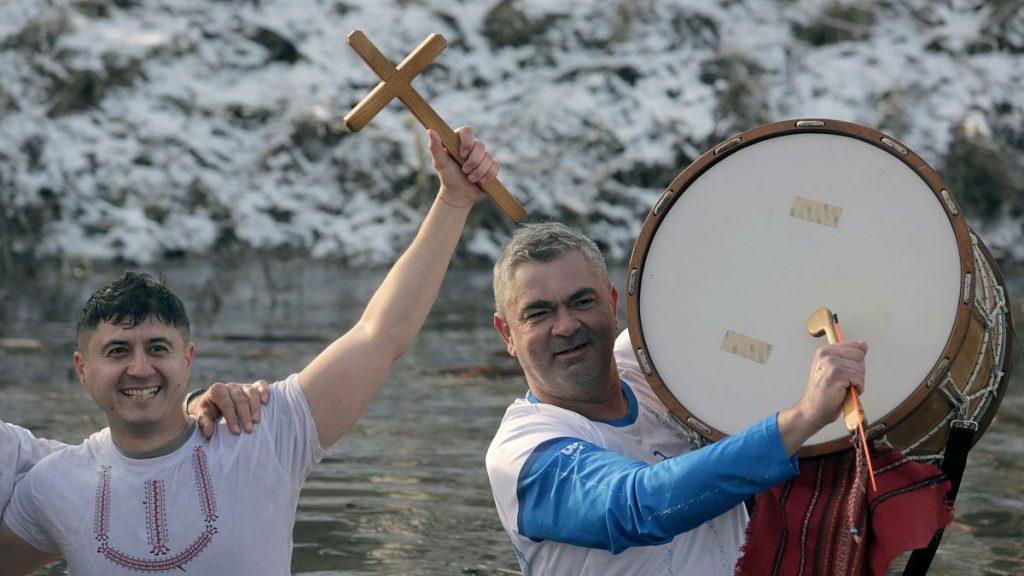Epiphany, a significant Christian feast day, marks the culmination of the Christmas season and is celebrated with diverse traditions across the globe. For Orthodox Christians, the focus lies on commemorating the baptism of Jesus Christ through the Blessing of the Waters ceremonies. These ceremonies, observed in countries like Bulgaria and Greece, involve a priest casting a cross into a body of water, often a river or the sea. Believers, undeterred by freezing temperatures, enthusiastically plunge into the icy depths to retrieve the cross, a symbolic act believed to bestow spiritual cleansing and good health for the coming year. The individual who recovers the cross is revered, and the priest then sprinkles holy water, often infused with basil, upon the gathered congregation. These ceremonies are often accompanied by traditional festivities, such as the “mazhko horo” in Bulgaria, a slow, ceremonial men’s dance performed in traditional attire while wading in the water, accompanied by folk songs and the waving of national flags.
In other Orthodox traditions, like those practiced near Piraeus, Greece, the retrieval of the cross is followed by two additional tosses, allowing three individuals to partake in the symbolic blessing. All participants in the dive are awarded medals to commemorate their involvement. Romania’s unique Epiphany celebration incorporates an annual horse race, where the animals, essential to village life, are blessed by a priest before competing. This tradition underscores the integral role of horses in rural communities, used for farming, transport, and other crucial tasks. The horse race is a festive occasion, with villagers enjoying traditional food and drink while cheering on the blessed animals. These varied Orthodox traditions highlight the rich tapestry of customs surrounding Epiphany, each emphasizing the spiritual significance of water and its connection to purification and blessing.
In contrast to the Orthodox focus on baptism, many Western Christian churches observe Epiphany as Three Kings Day, commemorating the visit of the Magi to the infant Jesus. This tradition acknowledges the manifestation of Christ to the Gentiles, symbolized by the wise men from the East. In Prague, Czech Republic, hardy swimmers embrace the icy waters of the Vltava River in an annual “Three Kings” swim, marking Epiphany with a bracing plunge. Poland’s vibrant Three Kings Day celebrations include elaborate processions through city streets, culminating in homage to Mary and Jesus. These processions, witnessed by locals and tourists alike, underscore the cultural significance of the holiday.
At the heart of the Catholic Church, Pope Francis presided over the Epiphany Mass at St. Peter’s Basilica in Vatican City, concluding the busy Christmas season and ushering in the 2025 Jubilee year. During the Mass and in his address to the faithful gathered in St. Peter’s Square, the Pope emphasized the importance of peace and prayer amid global conflicts, urging people to emulate the wise men’s journey to Bethlehem by seeking a deeper connection with Christ. The 2025 Jubilee, a significant event for the Catholic Church, is expected to draw millions of pilgrims to Rome, further intensifying the Pope’s already demanding schedule.
The Pope’s Epiphany activities extended beyond the liturgical celebrations. Following the Mass, he delivered his annual foreign policy address to the diplomatic corps, reinforcing the Vatican’s role in international affairs. A final meeting with US President Joe Biden further underscored the Vatican’s engagement with global leaders. The Pope concluded his Epiphany observances with the traditional baptism of infants in the Sistine Chapel, a poignant reminder of the sacrament at the heart of the feast day. This multifaceted approach to Epiphany demonstrates the Vatican’s commitment to both spiritual reflection and active engagement with the world.
In summation, Epiphany, while observed across various Christian denominations, manifests in distinct yet interconnected traditions. Orthodox Christians emphasize the baptism of Jesus through the symbolic Blessing of the Waters, while Western Christians commemorate the visit of the Magi, highlighting the revelation of Christ to the Gentiles. These diverse customs, from icy plunges to vibrant processions, from papal addresses to intimate baptisms, reflect the multifaceted nature of faith and the enduring significance of Epiphany as a celebration of divine manifestation and spiritual renewal. The common thread weaving through these diverse traditions is the recognition of Epiphany as a pivotal moment in Christian history, marking a turning point in the understanding of Christ’s identity and mission.

